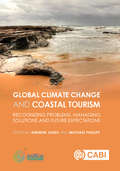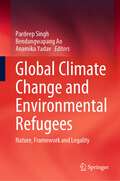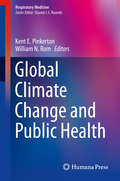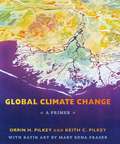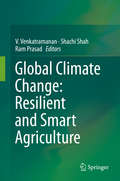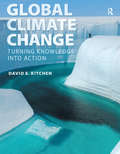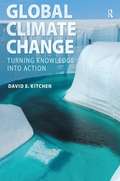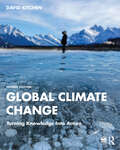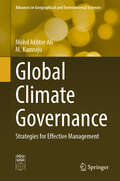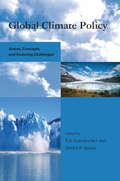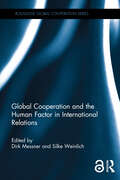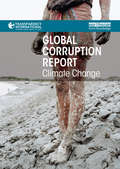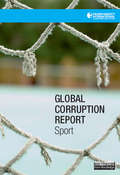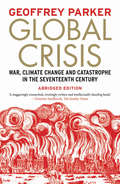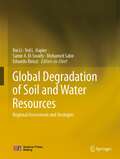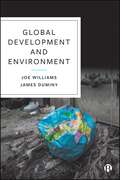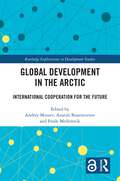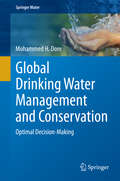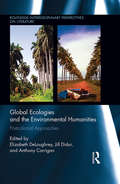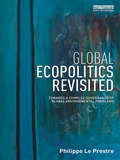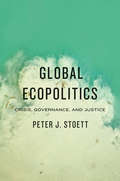- Table View
- List View
Global Climate Change and Coastal Tourism
by Michael Phillips Andrew JonesClimate Change and Coastal Tourism includes case studies on climate change and coastal tourism that explore current threats to and consequences of climate change on existing tourism coastal destinations. It assesses management and policy options for the future sustainability of threatened tourism coastal destinations. The cases discussed are from all regions of the world: Europe, The Americas, Asia, Africa, and Australasia. The book synthesize findings to make recommendations that can be used to promote strategies that ameliorate projected impacts of climate change on coastal tourism infrastructure and in turn promote the future sustainability of coastal tourism destinations.
Global Climate Change and Environmental Refugees: Nature, Framework and Legality
by Pardeep Singh Anamika Yadav Bendangwapang AoThis book explores the possibilities of understanding the concept of climate refugees in order to ascribe to a consensual agreement that climate refugees are evident and this situation is a reality.A framework to study both empirically and theoretically is presented in a detailed manner so that it may become a resource for understanding the challenges of climate refugees.Through discussion and analysis the book presents potential answers to such questions as:● Why has the international system been so short-sighted and has not given importance to the problems of climate migrants and refugees?● How to identify a climate refugee?● How do you justify a climate refugee or a migrant?● What are internally displaced people? Should we call them just refugees?The book covers the interdisciplinary nature of climate refugees and the perspectives of social science. The empirical findings provides an edge to holistically understanding climate refugees.This book discusses the concept of, what really is a climate refugee, and the necessary factors to make it an important part of the climate discourse. The legality of the term is missing in international parlance, and the academic discourse should provide the necessary critique required for the evolution of the subject under study. Therefore, the major objective of the book is to make the subject of climate migration known to all.
Global Climate Change and Public Health
by William N. Rom Kent E. PinkertonPulmonary physicians and scientists currently have minimal capacity to respond to climate change and its impacts on health. The extent to which climate change influences the prevalence and incidence of respiratory morbidity remains largely undefined. However, evidence is increasing that climate change does drive respiratory disease onset and exacerbation as a result of increased ambient and indoor air pollution, desertification, heat stress, wildfires, and the geographic and temporal spread of pollens, molds and infectious agents. Preliminary research has revealed climate change to have potentially direct and indirect adverse impacts on respiratory health. Published studies have linked climate change to increases in respiratory disease, including the following: changing pollen releases impacting asthma and allergic rhinitis, heat waves causing critical care-related diseases, climate driven air pollution increases, exacerbating asthma and COPD, desertification increasing particulate matter (PM) exposures, and climate related changes in food and water security impacting infectious respiratory disease through malnutrition (pneumonia, upper respiratory infections). High level ozone and ozone exposure has been linked to idiopathic pulmonary fibrosis, lung cancer, and acute lower respiratory infection. Global Climate Change and Public Health is an important new volume based on the research, findings, and discussions of US and international experts on respiratory health and climate change. This volume addresses issues of major importance to respiratory health and fills a major gap in the current literature. The ATS Climate Change and Respiratory Health Workshop was held in New Orleans, Louisiana, on May 15, 2010. The purpose of the meeting was to address the threat to global respiratory health posed by climate change. The workshop was attended by domestic and international experts as well as representatives of international respiratory societies and key US federal agencies. Dr. Pinkerton and Dr. Rom, the editors of this title, were co-chairs of the Climate Change Workshop and Symposium.
Global Climate Change: A Primer
by Orrin H. Pilkey Keith C. PilkeyAn internationally recognized expert on the geology of barrier islands, Orrin H. Pilkey is one of the rare academics who engages in public advocacy about science-related issues. He has written dozens of books and articles explaining coastal processes to lay readers, and he is a frequent and outspoken interviewee in the mainstream media. Here, the colorful scientist takes on climate change deniers in an outstanding and much-needed primer on the science of global change and its effects. After explaining the greenhouse effect, Pilkey, writing with son Keith, turns to the damage it is causing: sea level rise, ocean acidification, glacier and sea ice melting, changing habitats, desertification, and the threats to animals, humans, coral reefs, marshes, and mangroves. These explanations are accompanied by Mary Edna Fraser's stunning batiks depicting the large-scale arenas in which climate change plays out. The Pilkeys directly confront and rebut arguments typically advanced by global change deniers. Particularly valuable are their discussions of "Climategate," a manufactured scandal that undermined respect for the scientific community, and the denial campaigns by the fossil fuel industry, which they compare to the tactics used by the tobacco companies a generation ago to obfuscate findings on the harm caused by cigarettes.
Global Climate Change: Resilient and Smart Agriculture
by Ram Prasad Shachi Shah V. VenkatramananThis book provides essential insights into methods and practices of ‘Climate-smart Agriculture,’ which is driven by the principles of climate resilience and smart resource use in agricultural production. Climate-smart agriculture is a key policy instrument for achieving poverty eradication and a hunger-free world, as well as mitigating the effects of climate change. This book discusses in detail climate-smart agricultural technologies and practices that can reduce the vulnerability of agricultural systems, improve the livelihoods of farmers and other stakeholders, and reduce the greenhouse gas emissions from crop production and livestock husbandry. The agriculture, forestry and other land use (AFOLU) sector produces roughly 10–12 gigatons of CO2-equivalent per year; therefore, sustainable practices for agriculture and related land use hold immense potential to mitigate climate change. The potential impacts of climate variability and climate change on agriculture are extensively documented and articulated, especially with regard to global and national environmental agendas that call for innovation, transformation and climate-resilient advances in agriculture. As the book demonstrates, climate-smart agriculture offers an excellent tool for boosting agricultural output to feed the growing global population; for reducing greenhouse gases emissions from agriculture and other land use; and for protecting agricultural production systems from the impending dangers of climate change.
Global Climate Change: Turning Knowledge Into Action
by David E. KitchenThe science of climate change is a complex subject that balances the physical record and scientific fact with politics, policy, and ethics - and is of particular importance to the geosciences. This thoughtfully crafted new text and accompanying media encourage non-science majors to practice critical thinking, analysis, and discourse about climate change themes. Taking a cross-disciplinary approach, acclaimed educator and researcher, David Kitchen, examines not only the physical science, but the social, economic, political, energy, and environmental issues surrounding climate change. His goal: to turn knowledge into action, equipping students with the knowledge and critical skills to make informed decisions, separate facts from fiction, and participate in the public debate.
Global Climate Change: Turning Knowledge Into Action
by David KitchenThis book examines what scientists know about global warming and climate change and considers political and economic solutions that will balance the competing needs of people around the world.
Global Climate Change: Turning Knowledge Into Action
by David KitchenEarth’s climate is changing. This book investigates the scientific, environmental, social, political, and economic aspects of climate change. It enables students to reach an informed opinion and encourages active engagement in finding solutions. It begins with a strong introduction to the scientific factors that drive natural and anthropogenic climate change and expands over three chapters to explore the impact of greenhouse gases on the distribution of solar energy across land, sea, ice, and air. The author examines geologically ancient climates in order to highlight possible future scenarios, and case studies from around the world highlight the impact of climate change on the physical and human environment. The final chapters investigate how society can respond to the challenges of climate change and overcome the political, social, and economic factors that are barriers to progress, focusing on the role of energy policy, fiscal policy, and risk assessment as a means to stimulate discussion about science, society, and the role of the media. Science is the foundation of any solution, but to turn this knowledge into action requires the application of a broad set of skills that are rooted in the liberal arts experience such as critical thinking, analytical thinking, problem solving, and communication. This textbook will be an essential resource for students taking courses in environmental geography, climate change, natural hazards, climatology, and meteorology.
Global Climate Change: Turning Knowledge Into Action
by David KitchenProvides a holistic introduction to climate change: examines of the physical evidence of climate change and impacts, whilst explaining the political, economic and social issues that stand in the way of action. Accessible to non-science majors, whilst also useful to science majors who are new to the topic Presents the issues from the many stakeholders and special interest groups in a balanced way – leaving it to the reader to make their own decisions. Case studies from across the globe bring home the actual socio-economic impact of climate change. Links current crisis to global energy and production and consumption. Evidence for climate change from around the globe is examined, with a focus on physical basis of Earth systems and global warming to differentiate between natural and anthropogenic causes. Ancient climates are explored to help provide context for modern climates, along with a deeper exploration of the climate record from the past 150 years, bridging discussions of social and economic impacts of climate change. Key changes for the new edition: Text updated throughout to reflect updated data and to make note of recent advances in climate science and climate policy in the USA and around the world, including the Paris Agreement, the Green New Deal, stakeholder upheavals, updates in economic models, carbon trading, emissions standards, progress in the developing world, new IPCC reports and communication. Web content updated with links to more recent reports, sites and videos.
Global Climate Governance Beyond 2012
by Frank Biermann Fariborz Zelli Philipp PattbergAn assessment of policy options for future global climate governance, written by a team of leading experts from the European Union and developing countries. Global climate governance is at a crossroads. The 1997 Kyoto Protocol was merely a first step, and its core commitments expire in 2012. This book addresses three questions which will be central to any new climate agreement. What is the most effective overall legal and institutional architecture for successful and equitable climate politics? What role should non-state actors play, including multinational corporations, non-governmental organizations, public-private partnerships and market mechanisms in general? How can we deal with the growing challenge of adapting our existing institutions to a substantially warmer world? This important resource offers policy practitioners in-depth qualitative and quantitative assessments of the costs and benefits of various policy options, and also offers academics from wide-ranging disciplines insight into innovative interdisciplinary approaches towards international climate negotiations.
Global Climate Governance: Strategies for Effective Management (Advances in Geographical and Environmental Sciences)
by Mohd Akhter Ali M. KamrajuThis book serves as a comprehensive and insightful guide to the strategies and mechanisms that underpin effective climate governance on a global scale. From the Paris Agreement to the ongoing efforts within the United Nations Framework Convention on Climate Change (UNFCCC), this book offers an in-depth examination of the international and national initiatives that have emerged to address the intricate and multifaceted problem of climate change. It also provides an exploration of the scientific, political, and economic forces shaping the global climate landscape, casting a discerning light on the evolving dimensions of climate governance. The key features of the book are: 1) Understanding the Science: The book lays the foundation for a comprehensive understanding of the scientific principles underpinning climate change. 2) Political Dynamics: It delves into the intricacies of international climate negotiations, the roles played by major stakeholders, and the historical development of seminal climate agreements. 3) National Policies: The book goes beyond the international arena to investigate the diverse approaches and strategies adopted by nations worldwide. It explores their efforts to mitigate emissions, adapt to changing climate conditions, and promote sustainability at the national level. 4) Case Studies: Real-world case studies drawn from various regions and industries illuminate the successes and challenges of climate governance. These case studies offer valuable lessons for readers seeking practical insights into climate change solutions. 5) Innovations and Solutions: The book showcases the innovative technologies and strategies being developed to combat climate change. 6) Balanced Perspective: The book embraces a balanced perspective that confronts the complexities of climate governance, while also offering a beacon of hope by presenting actionable solutions for a sustainable, resilient future.
Global Climate Policy: Actors, Concepts, and Enduring Challenges (Global Environmental Accord: Strategies for Sustainability and Institutional Innovation)
by Urs Luterbacher Detlef F. SprinzAnalyses of the international climate change regime consider the challenges of maintaining current structures and the possibilities for creating new forms of international cooperation.The current international climate change regime has a long history, and it is likely that its evolution will continue, despite such recent setbacks as the decision by President Donald Trump to withdraw the United States from the Paris Agreement of 2015. Indeed, the U.S. withdrawal may spur efforts by other members of the international community to strengthen the Paris accord on their own. This volume offers an original contribution to the study of the international political context of climate change over the last three decades, with fresh analyses of the current international climate change regime that consider both the challenges of maintaining current structures and the possibilities for creating new forms of international cooperation.The contributors are leading experts with both academic and policy experience; some are advisors to governments and the Climate Secretariat itself. Their contributions combine substantive evidence with methodological rigor. They discuss such topics as the evolution of the architecture of the climate change regime; different theoretical perspectives; game-theoretical and computer simulation approaches to modeling outcomes and assessing agreements; coordination with other legal regimes; non-state actors; developing and emerging countries; implementation, compliance, and effectiveness of agreements; and the challenges of climate change mitigation after the Paris Agreement.ContributorsMichaël Aklin, Guri Bang, Daniel Bodansky, Thierry Bréchet, Lars Brückner, Frank Grundig, Jon Hovi, Yasuko Kameyama, Urs Luterbacher, Axel Michaelowa, Katharina Michaelowa, Carla Norrlof, Matthew Paterson, Lavanya Rajamani, Tora Skodvin, Detlef F. Sprinz, Arild Underdal, Jorge E. Viñuales, Hugh Ward
Global Cooperation and the Human Factor in International Relations (Routledge Global Cooperation Series)
by Silke Weinlich Dirk MessnerThis book aims to pave the way for a new interdisciplinary approach to global cooperation research. It does so by bringing in disciplines whose insights about human behaviour might provide a crucial yet hitherto neglected foundation for understanding how and under which conditions global cooperation can succeed. As the first profoundly interdisciplinary book dealing with global cooperation, it provides the state of the art on human cooperation in selected disciplines (evolutionary anthropology and biology, decision-sciences, social psychology, complex system sciences), written by leading experts. The book argues that scholars in the field of global governance should know and could learn from what other disciplines tell us about the capabilities and limits of humans to cooperate. This new knowledge will generate food for thought and cause creative disturbances, allowing us a different interpretation of the obstacles to cooperation observed in world politics today. It also offers first accounts of interdisciplinary global cooperation research, for instance by exploring the possibilities and consequences of global we-identities, by describing the basic cooperation mechanism that are valid across disciplines, or by bringing an evolutionary perspective to diplomacy. This book will be of great interest to scholars and postgraduates in International Relations, Global Governance and International Development.
Global Cooperation and the Human Factor in International Relations (Routledge Global Cooperation Series)
by Dirk Messner and Silke WeinlichThis book aims to pave the way for a new interdisciplinary approach to global cooperation research. It does so by bringing in disciplines whose insights about human behaviour might provide a crucial yet hitherto neglected foundation for understanding how and under which conditions global cooperation can succeed.As the first profoundly interdisciplinary book dealing with global cooperation, it provides the state of the art on human cooperation in selected disciplines (evolutionary anthropology and biology, decision-sciences, social psychology, complex system sciences), written by leading experts. The book argues that scholars in the field of global governance should know and could learn from what other disciplines tell us about the capabilities and limits of humans to cooperate. This new knowledge will generate food for thought and cause creative disturbances, allowing us a different interpretation of the obstacles to cooperation observed in world politics today. It also offers first accounts of interdisciplinary global cooperation research, for instance by exploring the possibilities and consequences of global we-identities, by describing the basic cooperation mechanism that are valid across disciplines, or by bringing an evolutionary perspective to diplomacy.This book will be of great interest to scholars and postgraduates in International Relations, Global Governance and International Development.
Global Corruption Report: Climate Change
by Transparency InternationalThe global response to climate change will demand unprecedented international cooperation, deep economic transformation and resource transfers at a significant scale. Corruption threatens to jeopardise these efforts. Transparency International's Global Corruption Report: Climate Change is the first publication to comprehensively explore such corruption risks. More than fifty leading experts and practitioners contribute, covering four key areas: governance: investigating major governance challenges towards tackling climate change mitigating climate change: reducing greenhouse gas emissions with transparency and accountability adapting to climate change: identifying corruption risks in climate-proofing development, financing and implementation of adaptation forestry governance: responding to the corruption challenges plaguing the forestry sector, and how these challenges need to be integrated into current international strategies to halt deforestation and promote reforestation. The Global Corruption Report: Climate Change provides essential policy analysis to help policy-makers, practitioners and other stakeholders understand these risks and develop effective responses at a critical point in time when the main architecture for climate governance is being developed.
Global Corruption Report: Sport
by Transparency InternationalSport is a global phenomenon engaging billions of people and generating annual revenues of more than US$ 145 billion. Problems in the governance of sports organisations, fixing of matches and staging of major sporting events have spurred action on many fronts. Yet attempts to stop corruption in sport are still at an early stage. The Global Corruption Report (GCR) on sport is the most comprehensive analysis of sports corruption to date. It consists of more than 60 contributions from leading experts in the fields of corruption and sport, from sports organisations, governments, multilateral institutions, sponsors, athletes, supporters, academia and the wider anti-corruption movement. This GCR provides essential analysis for understanding the corruption risks in sport, focusing on sports governance, the business of sport, planning of major events, and match-fixing. It highlights the significant work that has already been done and presents new approaches to strengthening integrity in sport. In addition to measuring transparency and accountability, the GCR gives priority to participation, from sponsors to athletes to supporters an essential to restoring trust in sport.
Global Crisis: War, Climate Change and Catastrophe in the Seventeenth Century - Abridged Ed.
by Geoffrey ParkerAn accessible synthesis of the prescient best seller exploring seventeenth-century catastrophe and the impact of climate change First published in 2013, Geoffrey Parker’s prize-winning best seller Global Crisis analyzes the unprecedented calamities—revolutions, droughts, famines, invasions, wars, and regicides—that befell the mid-seventeenth-century world and wiped out as much as one-third of the global population, and reveals climate change to be the root cause. Examining firsthand accounts of the crises and scrutinizing the prevailing weather patterns during the 1640s and 1650s—longer and harsher winters, and cooler and wetter summers—Parker reveals evidence of disrupted growing seasons causing malnutrition, disease, a higher death toll, and fewer births. This new abridged edition distills the original book’s prodigious research for a broader audience while retaining and indeed emphasizing Parker’s extraordinary historical achievement: his dazzling demonstration of the link between climate change and worldwide catastrophe 350 years ago. Yet, the contemporary implications of his study are equally important: are we prepared today for the catastrophes that climate change could bring tomorrow? At half the original length, this user-friendly abridgment is ideal for students and general readers seeking a rapid handle on the key issues.
Global Deforestation
by Runyan, Christiane and D’Odorico, Paolo Christiane Runyan Paolo D’odoricoGlobal Deforestation provides a concise but comprehensive examination of the variety of ways in which deforestation modifies environmental processes, as well as the societal implications of these changes. The book stresses how forest ecosystems may be prone to nearly irreversible degradation. To prevent the loss of important biophysical and socioeconomic functions, forests need to be adequately managed and protected against the increasing demand for agricultural land and forest resources. The book describes the spatial extent of forests, and provides an understanding of the past and present drivers of deforestation. It presents a theoretical background to understand the impacts of deforestation on biodiversity, hydrological functioning, biogeochemical cycling, and climate. It bridges the physical and biological sciences with the social sciences by examining economic impacts and socioeconomic drivers of deforestation. This book will appeal to advanced students, researchers and policymakers in environmental science, ecology, forestry, hydrology, plant science, ecohydrology, and environmental economics.
Global Degradation of Soil and Water Resources: Regional Assessment and Strategies
by Rui Li Ted L. Napier Samir A. El-Swaify Mohamed Sabir Eduardo RienziThis book focuses on soil and water conservation at global scale. It is a serious environmental problem that will threaten the socio-economic well-being of the majority of global population in future. The book examines the current situation of land degradation in multiple regions of the world and offers alternative approaches to solve the problems through sharing advanced technologies and lessons learned. It provides comprehensive assessment on characteristics, level and effect of degradation in different regions. It’s a highly informative reference both for researchers and graduate students.
Global Development and Environment
by Joe Williams James DuminyAvailable open access digitally under CC-BY licence. Development and environmental challenges are often framed at the global or planetary scale, but in a vague or apolitical manner. This book develops a theoretically rigorous and politicized concept of the planetary to intervene in contemporary debates on global development and to enhance our critical understanding of development as we approach the second quarter of the twenty-first century. Chapters explore key themes and processes including urbanization, demographic change, health, financialization, and infrastructure development. Referencing diverse cases and examples drawn from across the world, the book argues that the futures of global development are inseparable from environmental challenges and transformations.
Global Development in the Arctic: International Cooperation for the Future (Routledge Explorations in Development Studies)
by Anatoli Bourmistrov Frode Mellemvik Andrey MineevViewing the Arctic as a key region for global development in the 21st century, this book offers a cross-disciplinary conceptual framework for understanding what international cooperation is, why it is difficult and what kind of alternative views can apply in the Arctic. Written by Arctic experts, the book presents major trends and scenarios for international cooperation in the Arctic up to 2035 and future prospects for international cooperation in the Arctic in various sectors: energy, business and economy, transportation and logistics, climate change, diplomacy and security, culture, innovations, higher education and research. Implications of the scenarios for global development are discussed in the light of the United Nations Agenda for Global Development and Sustainable Development Goals (SDGs). The book offers a cross-disciplinary conceptual framework of international cooperation in the Arctic and discusses implications of this framework for global development. Filling the gap in analytical understanding of international cooperation, this book will be of interest to academics, students and professionals concerned with global development and the Arctic region.
Global Drinking Water Management and Conservation
by Mohammed H. DoreThis book discusses different drinking water treatment technologies and what contaminants each treatment method can remove, and at what costs. The production of drinking water requires adequate management. This book attempts to fill the existing knowlegde gap about (a) water treatment technologies and their costs, (b) risk assessment methods, (c) adverse health effects of chemical contaminants, (d) management protocols, and varying regulatory practices in different jurisdictions, and what successes are possible even with small financial outlays. Addressing water consulting engineers, politicians, water managers, ecosystem and environmental activists, and water policy researchers, and being clearly structured through a division in four parts, this book considers theoretical aspects, technologies, chemical contaminants and their possible elimination, and illustrates all aspects in selected international case studies. Source-water protection, water treatment technology, and the water distribution network are critically reviewed and discussed. The book suggests improvements for the management of risks and financial viability of the treatment infrastructure, as well as ways toward an optimal management of the distribution network through the risk-based management of all infrastructure assets.
Global Ecologies and the Environmental Humanities: Postcolonial Approaches (Routledge Interdisciplinary Perspectives on Literature)
by Edited by Elizabeth DeLoughrey, Jill Didur, and Anthony CarriganThis book examines current trends in scholarly thinking about the new field of the Environmental Humanities, focusing in particular on how the history of globalization and imperialism represents a special challenge to the representation of environmental issues. Essays in this path-breaking collection examine the role that narrative, visual, and aesthetic forms can play in drawing attention to and shaping our ideas about long-term and catastrophic environmental challenges such as climate change, militarism, deforestation, the pollution and management of the global commons, petrocapitalism, and the commodification of nature. The volume presents a postcolonial approach to the environmental humanities, especially in conjunction with current thinking in areas such as political ecology and environmental justice. Spanning regions such as Africa, Asia, Eastern Europe, Latin America and the Caribbean, Australasia and the Pacific, as well as North America, the volume includes essays by founding figures in the field as well as new scholars, providing vital new interdisciplinary perspectives on: the politics of the earth; disaster, vulnerability, and resilience; political ecologies and environmental justice; world ecologies; and the Anthropocene. In engaging critical ecologies, the volume poses a postcolonial environmental humanities for the twenty-first century. At the heart of this is a conviction that a thoroughly global, postcolonial, and comparative approach is essential to defining the emergent field of the environmental humanities, and that this field has much to offer in understanding critical issues surrounding the creation of alternative ecological futures.
Global Ecopolitics Revisited: Towards a complex governance of global environmental problems
by Philippe Le PrestreFaced with worsening environmental indicators, cooperation hurdles, and the limited effectiveness of current institutions, reforming international environmental governance has proven elusive, despite various diplomatic initiatives at the United Nations level over the last two decades. Overcoming the current dead end, however, may rest less in devising new arrangements than in challenging how the problem has been approached. Presenting a multifaceted exploration of some of the key issues and questions in global ecopolitics, this book brings together recent advances in research on global environmental governance in order to identify new avenues of inquiry and action. Each chapter questions elements of the current wisdom and covers a topic that lies at the heart of global environmental governance, including the reasons for engagement, the evolving relationship between science and policy, the potential and limits of the European Union as a key actor, the role of developing and emergent countries, and the contours of a complex governance of international environmental issues. Laying the foundation for rethinking at a time of great transformation in global ecopolitics, this book will be important reading for students of environmental politics and governance. It will also be of relevance to policy makers with an interest in going beyond the prevailing discourse on this crucial topic.
Global Ecopolitics: Crisis, Governance, And Justice
by Peter StoettDespite sporadic news coverage of extreme weather, international conventions on climate change, or special UN days, rarely do we participate in a sustained analysis of environmental policy making. To remedy this shortcoming and to propel the discussion forward, Peter J. Stoett provides a concise introduction to environmental governance. Through seven case studies, Stoett analyzes the ability of international policy to provide environmental protection and discusses the ever-present factors of equality, sovereignty, and human rights integral to these issues. While providing a panoramic view of the actors and structures producing these policies, Stoett reminds readers that the topic is personal, that responsible governance is not solely the charge of governments but of individuals and communities as well.
